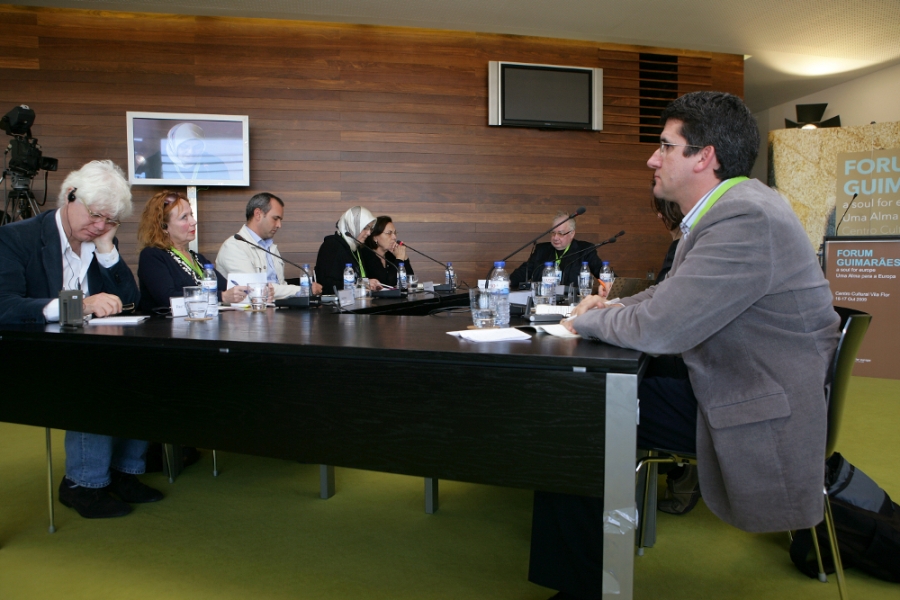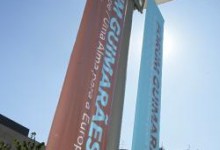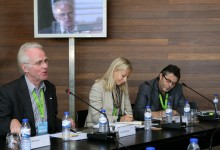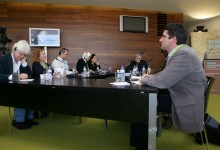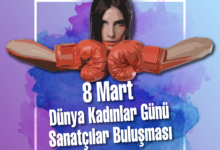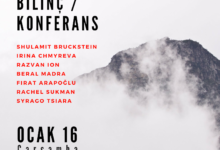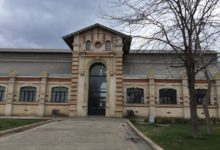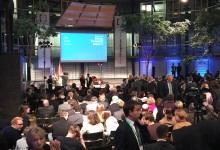Mahir Namur, Ayşe Böhürler, BM, Steve Austen (Felix Meritis)
A Soul for Europe / Uma Alma para a Europa
16-17 AUGUST 2009
Centro Cultural Vila Flor, Guimares, Portugal
The role of culture in the transformation of the European cities
Forum Guimarães took place on 16-17 October 2009 in Guimarães, North Portugal. The city had been recently confirmed as theEuropean Capital of Culture in 2012, which reinforced the significance of organizing this Forum in Guimarães. The Forum was one of the first initiatives of the European Cultural Capital 2012, which aims to enhance the transformation of the urban scene through culture. The European Capital of Culture project was assumedly a European Cultural Leadership project and the involvement of the civil society was paramount to its goals.
Forum Guimarães set up various discussion panels on issues ranging from the European dimension of urban development, to the participation of civil society and also held debates concerning best practices of community engagement and evaluation among previous and future European Capitals of Culture. It had a wide scope of participants, including MEPs, national cultural practitioners, local councillors and government officials, as well as a team of active members of the “A Soul for Europe” Initiative. Additionally, there had been a series of parallel networking opportunities among Portuguese and international cultural agents.
Forum Guimarães marked a crucial step in the preparations for Guimarães’s assumption of the title European Capital of Culture 2012. The Forum brought together a significant group of those who have been involved in directing the European Cultural Capitals and influential cultural networks in Europe during the last 25 years. 200 hundred people attended the Forum during these two days of work, between experts, professionals in culture and civil society.
Organisers:The “A Soul for Europe” Initiative in co-operation with the Município de Guimarães and SETEPÉS, Oporto
Official Sponsor: Guimarães – Capital Europeia da Cultura 2012
In cooperation with: A Oficina
Source: http://www.asoulforeurope.eu/node/1292
Presentation for Guimares Forum
Beral Madra
In general there are three main objectives to realize ECC project in the EU cities:
-It is time to transform the modernist, polarised and elitist infrastructures of the culture industries. i.e. the infrastructures in many countries that cannot fulfil their function of inspiring, promoting, enriching, stirring the spirit and wisdom of the societies. i.e. to restore the polarised positions of the artists, experts, officials, politicians and the public in the cultural sphere.
-The problems of the global culture are already touched by Guy Debord in his “Society of the Spectacle”. Nothing has changed since he has written it. All over the world, regardless of history, tradition, race, religion, and governments the entire life seems like a gigantic spectacle created by the consumption economy. The spectacle presents the current world culture as a delirious monologue. According to Debord, the more the people watch this spectacle, the less they live. From this point, any attempt to realize ECC is a restoration of the mental command of the people.
-Today the culture is the most effective tool to educate people to be active citizens of the democracies. We all know that democracy is still an utopia for many societies. The border between neo-liberal economy and social democracy is being violated continuously. Culture is a valuable instrument to deal with corruption and violation of economic rights of the masses.
Therefore the ECC project should contain a concept and a strategy to find a new collaboration and collectivity between the creative people, the officials and the public and make people aware of this deep lethargy and wake up to live in dignity. In this respect the most important actor/expert to take the responsibility of creating projects to this goal, is the contemporary artist, the creative individual.
These were my thoughts when I accepted this task.
I invited artists to my advisory committee. They have acknowledged Istanbul 2010 Culture Capital Europe as a project:
-to conceive and establish a new map of cultural and artistic dialogue and collaboration between state, local authorities and civil cultural actors
-to maintain the cultural reciprocity between Turkey and EU.
-to focus on the key-subject of culture industry the creative individual and producer
– to provide sustainability of cultural processes and the welfare for the city and the citizen, for the youth and its education and fort he intercultural dialogue in the region.
The most significant problems in İstanbul culture and arts scene are:
-centralised, elitist event culture that consumes 70% of the money available for culture
-no public funds for creative projects and education in arts and culture
–monopolies of corporate culture
-weak networking between artists, creative poeple, NGO2s and universities
-sporadic (not sustainable) networking and collaborations with EU counterparts.
As visual arts we have launched two projects:
PORTABLE ART and LIVES and WORKS in ISTANBUL 2010 ECOC
Portable Art: 15 million people with mostly rural origin and emigrant character in 39 municipalities; some of them 30-35 km away from the center. Industrial areas, labor and lower middle classes, a passive women population…Municipalities have built cultural centers; buildings with concert halls, exhibition halls, workshop spaces, libraries etc.
We comission young curators and artist intiatives to prepare exhibitions and performances to be moved from one district to the other, mostly with concepts that will attract the interest of these communities.
An education program for cultural operators of municipalities is being realized.
Lives and Works in İstanbul focuses on the higher education of creative youth and gives them the opportunity to work and produce with renown artists from EU. The artists (Salvadori, Muntadas, Burgin, Kogler, Lappas, Ivekovic, Calle) will live and work in Istanbul and motivate the participants. At the end 70 young artists will benefit from this project.
********************************************************************************************************************
Board II 15h00 – 18h00
The European Capital of Culture as a strategy for regional development
The role of the European Capital of Culture in promoting regional sustainable development
Guimarães and its surrounding area, Vale do Ave, are going through both a crisis and a restructuring process of the regional economic foundation. This district has been one of the trailblazers in the industrialization process during the second half of the 19th century – as concerns clothing and textile industries. Such businesses are still a major source of employment in the area. Meanwhile, globalization and market mutation have aggravated competition practices and the region feels that in a contradictory manner. Some big industrial units go bankrupt and, consequently, the network of small companies associated to subcontracting procedures is affected. At the same time, other companies from sectors with greater added value and commercial strategies oriented to specific niche markets are strengthened. The problem is that the last intensive industrialization wave of disqualified work left a “social invoice”, which is composed by an unemployed working class, with no school certificate, with little financial resources and often leading new generations to escape from school and precociously search for unstable and poorly paid jobs.
Parallelly, other economic sectors were developed, generating job opportunities and having a different expression. Just by considering the recent advancement of investments in Guimarães, one realizes that great public investments in the health sector or in the university, as well as in other commerce and service sectors (great commercial surfaces and small companies), and in cultural equipment, have reinforced the competitiveness and attractiveness of both the municipality and the region, diversifying lifestyles and cultural practices. In regards to the transforming industry, the good news has to do with the appearing of companies
featuring high technological incorporation, in different sectors of regional specialization. In view of the agglomeration and polarization of urban agglomerations in the Metropolitan Area of Porto (Southward) andBraga (Northward), Guimarães clearly emerges as a new reference on a regional level.
It is not easy to guess the effects that the European Capital of Culture, ECC, can have in such a context, since there are very contrasting expectations: on the one hand, there will be cosmopolitanism dreams regarding cultural supply and demand; on the other, an emancipation potential for impoverished populations with very localized and limited cultural practices. This is the squaring of the circle.
Nothing else is expected from “culture” (whatever it is) but the following:
– pure entertainment and spectacle, according to a programmed sequence of events “purchased abroad” and with a limited or null future effect;
– promotion of various and minority manifestations addressed to restricted customers in an equal manner;
– intense scheduling for a year, with no continuity and routing, that is the capacity to create opportunities to involve institutions and populations, and guarantee project prosecution.
There will certainly be a little bit of everything, but durability and the assurance to create multiplying effects are expected to constitute the greatest challenge, perhaps especially in what concerns to the “human capital”, rather than in measurable quantities of job posts or “culture” companies. It does not matter how small its elements are. It will be reasonable to expect a densification and a variation of the institutional network involved in cultural production and sharing.
Our concept of culture is comparable to software that can be installed, expanded and continually improved. Culture can be cultivated. The greatest challenge will probably be to break personal and institutional routines – in schools, for example -, or to mobilize and enrich the cultural experiences of those who go through the above-mentioned trials and are practically hostages of television entertainment and some, few, local initiatives. It is a challenge to use the intensification of cultural practices as a social emancipation instrument. It requires time to be prepared and mature. If one wishes to convert an empty plant into a cultural creation workshop and a sociability centre of attraction with a “view toEuropeand the World”, it will be difficult to plan that as if it was a series of shows and a diffusion strategy. Schools require logistical conditions, common effort, breaking of routines, professionalism and strong will. Such circumstances might allow a better development of the idea of “Europe”, which is out of focus nowadays, being rather focused on common places or quite unknown diversity mosaics. One can’t live what he doesn’t know.
From a strictly sociological perspective, those who retain the financial and social capital, diplomas,…, and, at the same time, belong to favored social environments, are not “imprisoned” in a territory or in a city; they move. Guimarães and Vale do Ave have plenty highways. Such a cultural event as an ECC makes a difference, especially for those who do not have that physical and social mobility. Doing it there and together with local people makes all the difference and much more when their experience is absorbed and taken along. The exceptionality of the historical city ofGuimarães– also a resource for the so called “cultural tourism” and for the “culture industries” – is not enough. It is just an identifying reference and a focus point with a large visibility and social share. Besides that, there is everyday life, experiences from daily routine, the absorption of work and, in specific cultures (business-related, working class, etc.), some needs and lack of knowledge.
Despite the crisis or precisely because of it, it is important to take profit from the local business-related culture, which is itself a means of transmission for internationalization and worldly knowledge, and, at the same time, a link to technical and scientific cultures. The same can be said about the University.
Intensifying cultural practices is an experience and an inquietude that can change everything, and the world is already complicated enough to acknowledge the urgent need to know, to feed curiosity, to be opened to the unknown, to copy or emulate experiences, to have the ability to read and understand…; in a single phrase: to acquire culture.
Álvaro Domingues

